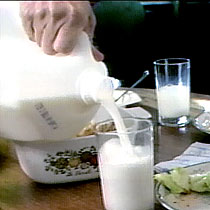2007年VOA标准英语-Consumers Call for Ban on Growth Hormone in Mil(在线收听)
Washington
24 April 2007
One of the largest groups of milk producers in the United States has set an August first deadline for its members to stop treating their cows with a growth hormone, or pay more to get their milk to market. The move is a reaction to pressure by consumer groups opposed to the use of the hormone rBST, which increases milk production. VOA's Melinda Smith reports on the health and economic concerns of the hormone's use.
 |
In 1993, the U.S. Food and Drug Administration approved the use of a genetically engineered growth hormone called rBST. It is sold under the brand Posilac, and stimulates as much as 10 percent more milk in cows.
Dennis Areias is a dairy farmer in California who uses rBST. "What it does, it enhances her appetite to get her to eat more. The more she eats, the more she will milk."
But not everyone is happy with that idea. In February 2007, three health advocacy groups asked the Food and Drug Administration to withdraw its approval of rBST. They say the hormone increases the risk of breast, colon and prostate cancers, and may be linked to early puberty.
Representatives of the dairy industry and Monsanto, the hormone's manufacturer, say there is no scientific proof that links rBST to cancer.
So who is behind the effort to stop production of rBST? Some say it is driven by consumers who will not buy hormone-laced food.
"...I just thought it better to be safe than sorry," expressed one shopper. "Well, it just makes sense to me to try and make sure that our food is as clean as possible," said another.
Or, is it simply pressure from advocacy groups opposed to any food additives? Patty Lovera is with the organization, Food and Water Watch. "We are headed in the right direction, which is more and more companies are saying they are not going to buy milk that's produced that way."
One of the largest dairy associations is California Dairies Incorporated. It distributes at least 10 percent of the milk in the United States. It has told its members they must stop using rBST by August 2007 or pay more to ship their hormone treated milk to stores that will take it.
Richard Cotta of California Dairies says the company is responding to consumer preference for milk free of hormones. "Our attitude is if the consumer wants it and is willing to pay for it, we are going to try and make it available to them," he said.
There are about 60,000 herds in the U.S. and some estimates say that one-third have been treated with rBST. But a spokesman for the National Milk Producers Federation, which represents most of the dairy cooperatives in the United States, believes that figure may be lower now because of the negative publicity surrounding the hormone.